
views
Washing Your Face Properly
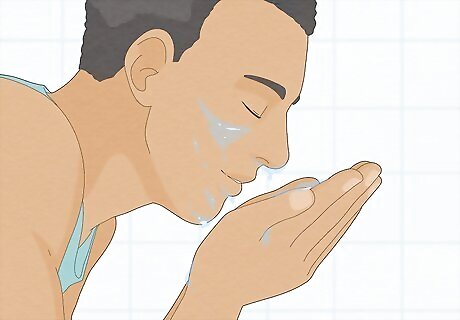
Wet your skin with warm water. Warm water will open up your pores and help your cleanser foam up to give your a good clean. Make sure the water is warm. If it's too cold the pores will close up and you won't be able to clean them out. If it's too hot your skin will get irritated. Apply the water with your hands. Using a towel will irritate your skin due to the friction caused by rubbing.
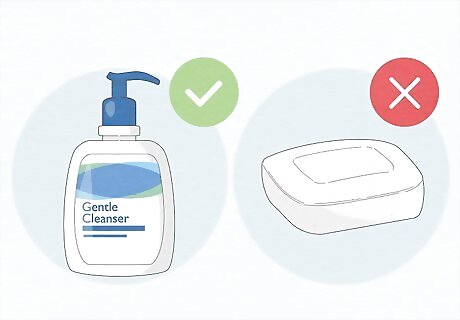
Choose the right facial cleanser. You'll want a gentle cleanser that's free of alcohol and any other harsh chemicals. These can further irritate your skin instead of cleaning it. Remember to apply it with your hands instead of a towel. It might be helpful to identify your skin type to help you choose the right kind of facial cleanser for your skin. Use a liquid facial cleanser rather than a bar. Bar soaps tend to dry out the skin more than liquid soaps. This might be okay if your skin is naturally oily, but if you have dry skin than bar soaps will probably cause irritation. If you notice that your skin is tight or itchy after washing, try switching to a liquid cleanser. If you suffer from acne, look for a cleanser with salicylic acid, glycolic acid, or benzyl peroxide. These ingredients will give your a deeper clean and act as astringents that will kill acne-causing bacteria. You can go with a brand name cleanser, such as Cetaphil, Noxzema, or Neutrogena, or opt for a generic cleanser.
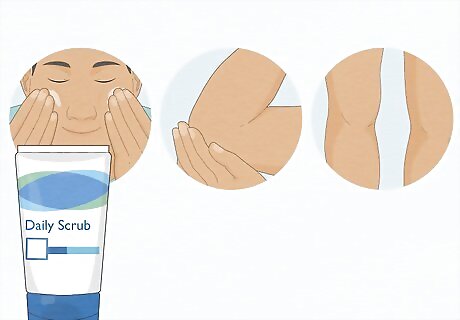
Exfoliate your skin. If your skin was very dirty or you recently sweat profusely, you might require a deeper clean. Exfoliating will strip away dead skin and dirt, revealing shiny new layers beneath. Again, choose an exfoliant that is alcohol-free. While most exfoliate their faces, you can also exfoliate your elbows and knees to help soften your skin.

Rinse with lukewarm water and pat dry with a towel. After cleansing, rinse to allow dirt and bacteria to flow out of your pores. Then gently pat your face with a towel until it's dry. Do not rub the towel on your face. This will irritate your skin.
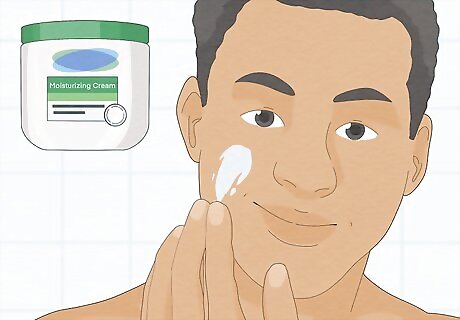
Apply a moisturizer. Washing your face strips it of essential oils that protect your skin. To keep your face healthy, apply moisturizer every time you wash it. For dry skin, use a cream moisturizer. For normal skin, use a lotion. For oily skin, use gel.
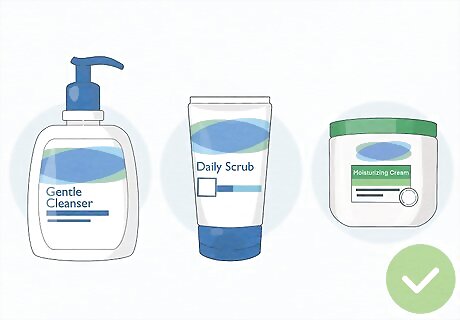
Repeat this process only twice a day. Excessive washing will strip away oils and cause irritation. You don't need to wash anymore than twice a day to keep your skin healthy. You can, however, wash more often if you've just exercised and are sweating profusely. There are many different types of facial moisturizers. Try choosing a brand that carries a special formulation for men, such as Neutrogena or Nivea. Or, you can always go with a generic facial moisturizer if you are on a budget.
Shaving Properly

Choose a razor with one or two blades. If you're prone to razor burn or ingrown hairs, a multi-blade razor can make the problem worse. These razors shave too close to the skin and cause irritation. Single or double bladed razors won't get so close, which will help prevent irritation. Throw away disposable razors or change the blades in your razor every five to seven shaves.
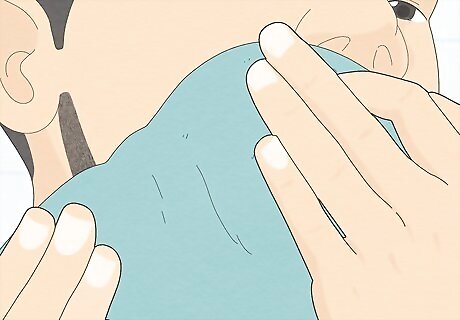
Wet your skin before you start shaving. Always make sure to wet your skin before you shave your face. This will help to moisten your skin and soften the hairs, which makes shaving easier. You can splash warm water on your face, or wet a washcloth with warm water, wring it out, and then wrap it around you face and neck to help prep your skin.
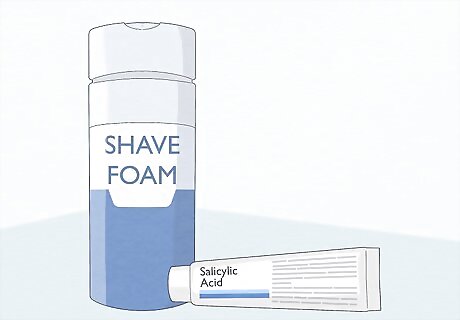
Use shaving cream. Shaving cream creates a barrier between your skin and the razor, so it can help to prevent nicks and razor burn. Find shaving cream with glycolic acid or salicylic acid to prevent ingrown hairs. These two ingredients exfoliate the skin and help prevent razor burn. They will also kill pimple-causing bacteria.
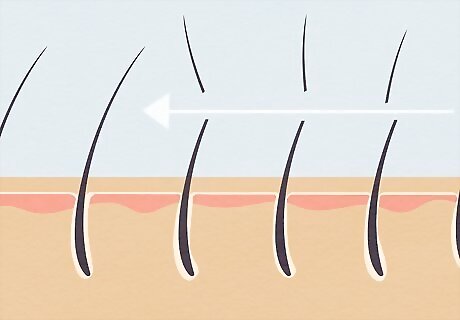
Shave in the direction of your hair growth. Do not shave against the grain of your hair. Shave in the direction of your facial hair growth. Be cautious when shaving around acne. Do not try to shave off your acne. Just shave over it lightly, or try using an electric razor to trim facial hair in these areas.
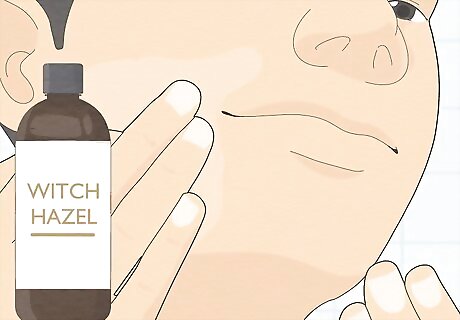
Apply witch hazel after shaving. Witch hazel helps fight irritation, infection, and redness. It can also tighten the skin, giving your face a firmer appearance. In addition, witch hazel can reduce swelling, which makes it good to apply around the eyes if you've been up all night.
Maintaining Healthy Skin with Your Diet

Get plenty of vitamin A. Vitamin A is a nutrient that helps keep skin firm and aids in skin regeneration. Some of the best sources for vitamin A are low-fat dairy products, carrots, fortified grains and cereals, and eggs.

Include antioxidants in your diet. Antioxidants help strengthen cell membranes, protecting the cells from damage. They also help the body regenerate new cells. This can lead to healthier, more vibrant looking skin. Some of the best sources for antioxidants are: Berries, especially strawberries, blackberries, and blueberries. Plums. Green tea.

Add omega-3 fatty acids to your diet. Omega-3's help skin cells filter out waste and bring in nutrients. They also help cells retain water, leading to moist and strong skin. The best sources for omega-3's are fish like salmon and sardines, nuts, and canola oil.
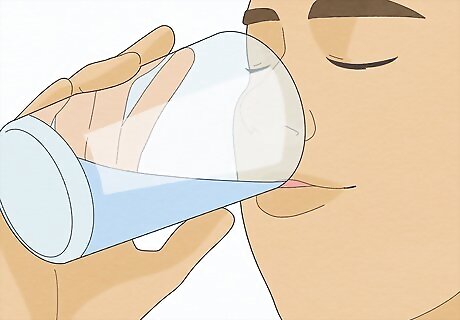
Stay hydrated. Water essential for countless activities in the body. For you skin, it will keep the cells hydrated. It also helps flush waste products away from the skin. Furthermore, when you're hydrated you sweat more efficiently, which is helpful to clear out the pores. The recommended amount of water you should drink daily varies, but the old standard of 8 glasses should work fine.

Avoid processed sugar. Studies indicate that a diet high in sugar leads to signs of premature aging like wrinkles and dark spots. Cut out junk foods and soft drinks to help protect your skin from premature aging.
Maintaining Healthy Skin with Lifestyle Choices
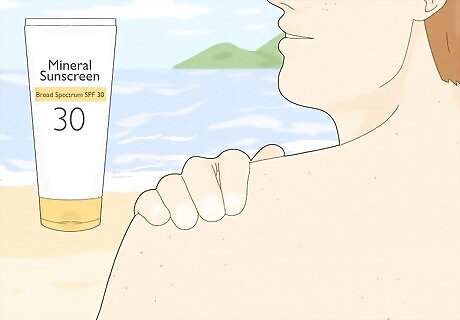
Use sunscreen whenever you're out in the sun. UV rays from the sun damages cells and can lead to wrinkles and dark spots on your skin. You should always protect your skin with sunblock when out in the sun. Dermatologists recommend using at least SPF 30 for proper protection. Remember to reapply every 3 to 4 hours to keep your protection up.
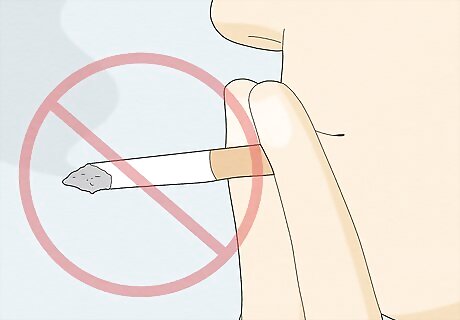
Avoid smoking. Among the countless health risks of smoking are skin damage. Smoking narrows the blood vessels close to the skin's surface, choking it of essential nutrients and leading to a buildup of waste products. To keep your skin healthy, it's best to avoid smoking altogether.

Reduce stress. Stress can lead to breakouts and other skin imperfections. You should do all you can to reduce your stress level, not only for your skin, but for your overall health. Read Reduce Stress for tips on how you can live a less stressful life.

Get plenty of sleep. The body repairs itself while you sleep. That means that any damage your skin experienced during the day gets fixed overnight. If you don't sleep enough your skin won't get repaired. Commit to getting a full 8 hours of sleep as often as possible. Over time, this will result in healthier, younger looking skin.

Exercise regularly. Exercise has a number of health benefits for your skin. The increase in circulation will bring more blood to your skin, which filters in nutrients and flushes away toxins. Sweating also clears out the pores. Commit to any number of physical activities to keep your skin well hydrated and nourished. Remember to wash your face after exercising, however. Sweat can also trap dirt and bacteria, so you'll want to remove all of that to keep your skin healthy.


















Comments
0 comment